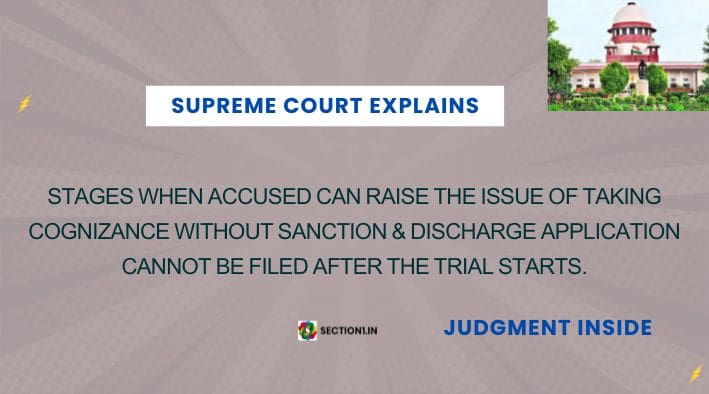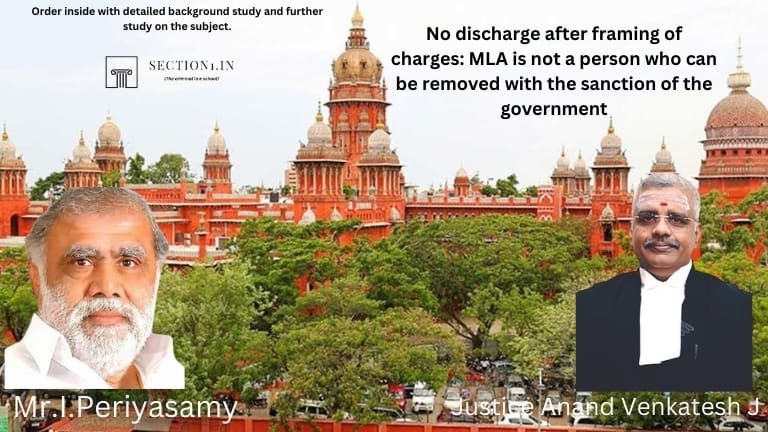Question of law
6. In view of the afore-stated undisputed facts the following questions arise for consideration before this Court:
(i) Whether the High Court in exercise of its powers under Section 482 of CrPC could have discharged the respondent accused from the charges levelled against him for the offences under Section 13(1)(e) punishable under Section 13(2) of the said Act, despite the fact that the accused had not pressed for his second application for discharge by submitting the Memo dated 02.12.2014 and despite the fact that after framing of the charge by the Special Court on 23.12.2014, the trial had proceeded further and the prosecution had examined 17 witnesses in support of its case?
(ii) Whether the High Court in the criminal petition filed under Section 482 of the CrPC could reverse the findings recorded by the Special Court with regard to the validity of sanction, ignoring the bar contained in sub-section (3) read with subsection (4) of Section 19 of the said Act?
10. Having regard to the afore-stated provisions contained in Section 19 of the said Act, there remains no shadow of doubt that the statute forbids taking of cognizance by the Court against a public servant except with the previous sanction of the Government/authority competent to grant such sanction in terms of clauses (a), (b) and (c) to Section 19(1). It is also well settled proposition of law that the question with regard to the validity of such sanction should be raised at the earliest stage of the proceedings, however could be raised at the subsequent stage of the trial also. In our opinion, the stages of proceedings at which an accused could raise the issue with regard to the validity of the sanction would be the stage when the Court takes cognizance of the offence, the stage when the charge is to be framed by the Court or at the stage when the trial is complete i.e., at the stage of final arguments in the trial. Such issue of course, could be raised before the Court in appeal, revision or confirmation, however the powers of such court would be subject to sub-section (3) and sub-section (4) of Section 19 of the said Act. It is also significant to note that the competence of the court trying the accused also would be dependent upon the existence of the validity of sanction, and therefore it is always desirable to raise the issue of validity of sanction at the earliest point of time. It cannot be gainsaid that in case the sanction is found to be invalid, the trial court can discharge the accused and relegate the parties to a stage where the competent authority may grant a fresh sanction for the prosecution in accordance with the law.
11. The combined reading of sub-section (3) and (4) of Section 19 makes it clear that notwithstanding anything contained in the Code, no finding, sentence or order passed by the Special Judge shall be reversed or altered by a Court in appeal, confirmation or revision on the ground of, the absence of, or any error, omission or irregularity in the sanction required under sub-section (1), unless in the opinion of the Court, a failure of justice has in fact been occasioned thereby. sub-section (4) further postulates that in determining under subsection (3) whether the absence of, or any error, omission or irregularity in the sanction has occasioned, or resulted in failure of 11 justice, the Court shall have regard to the fact whether the objection could and should have been raised at an earlier stage in the proceedings. The explanation to sub-section (4) further provides that for the purpose of Section 19, error includes “competency of the authority to grant sanction”. Thus, it is clear from the language employed in sub-section (3) of Section 19 that the said sub-section has application to the proceedings before the Court in appeal, confirmation or revision, and not to the proceedings before the Special Judge. The said sub-section (3) clearly forbids the court in appeal, confirmation or revision, the interference with the order passed by the Special Judge on the ground that the sanction was bad, save and except in cases where the appellate or revisional court finds that the failure of justice had occurred by such invalidity.
12. This Court in case of Nanjappa Vs. State of Karnataka [(2015) 14 SCC 186] has very aptly dealt with the intricacies of Section 19(1) as also Section 19(3) and 19(4) of the said Act as to at what stage the question of validity of sanction accorded under Section 19(1) of the said Act could be raised, and what are the powers of the court in appeal, confirmation or revision under sub-section (3) of Section 19 of the said Act.
13. In State of M.P. vs. Bhooraji and Others [(2001) 7 SCC 679], this Court had an occasion to deal with the various aspects contained in Section 465 of CrPC more particularly to deal with the expression “A failure of justice has in fact been occasioned” as contained therein. Since, the provisions contained in Section 19(3) of the Prevention of Corruption 14 Act and in Section 465(1) of CrPC are pari materia, the observations made in the said decision would be relevant.
Discharge cannot be filed during trial
14. In the instant case, the Special Judge proceeded with the trial, on the second application for discharge filed by the respondent having not been pressed for by him. The Special Judge, while dismissing the third application filed by the respondent seeking discharge after examination of 17 witnesses by the prosecution, specifically held that the sanction accorded by the government which was a superior authority to the Karnataka Water Supply Board, of which the respondent was an employee, was proper and valid. Such findings recorded by the Special Judge could not have been and should not have been reversed or altered by the High Court in the petition filed by the respondent challenging the said order of the Special Judge, in view of the specific bar contained in sub-section (3) of Section 19, and that too without recording any opinion as to how a failure of justice had in fact been occasioned to the respondent-accused as contemplated in the said sub-section (3). As a matter of fact, neither the respondent had pleaded nor the High Court opined whether any failure of justice had occasioned to the respondent, on account of error if any, occurred in granting the sanction by the authority.
15. As a matter of fact, such an interlocutory application seeking discharge in the midst of trial would also not be maintainable. Once the cognizance was taken by the Special Judge and the charge was framed against the accused, the trial could neither have been stayed nor scuttled in the midst of it in view of Section 19(3) of the said Act. In the instant case, though the issue of validity of sanction was raised at the earlier point of time, the same was not pressed for. The only stage open to the respondent-accused in that situation was to raise the said issue at the final arguments in the trial in accordance with law.
Party
STATE OF KARNATAKA LOKAYUKTA POLICE vs. S. SUBBEGOWDA – CRL APL NO: 1598 OF 2023- 03.08.2023
click here to go to direct link
state of karnataka vs. s.subbegowda
Further study
- Section 311 Cr.P.C: Recall may be allowed if no occasion to bring relevant facts at initial deposition
- Whether Criminal case against police officer can be filed without sanction obtained u/s 197 Cr.P.C?
- WHETHER SANCTION IS NECESSARY AT THE STAGE OF DIRECTION UNDER SECTION 156(3) CR.P.C? CASE REFERRED TO LARGER BENCH.
- Sanction: Manufacturing or fabrication of public documents and records cannot be a part of the official duty of a public servant hence sanction not required
- WHETHER I.O HAS TO FILE FINAL REPORT EVEN AFTER COMES TO THE OPINION THAT THERE IS NO CASE MADE OUT?






